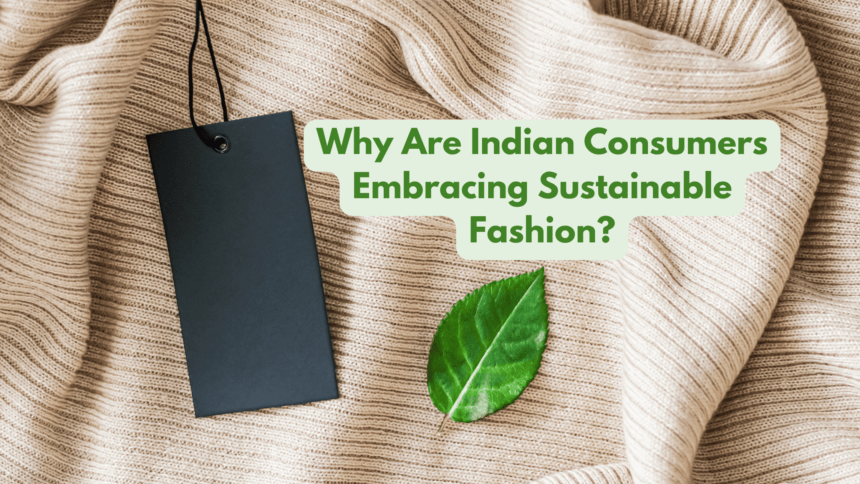Introduction
Sustainable fashion
Sustainable fashion, characterized by environmentally friendly practices, ethical production, and economic viability, is gaining significant traction among Indian consumers. This burgeoning interest is not merely a passing fad but a reflection of a profound shift in consumer values and awareness. The Indian market, traditionally dominated by fast fashion, is witnessing a remarkable transition towards sustainability, driven by various factors including environmental concerns, economic benefits, health advantages, cultural preservation, and increasing consumer awareness.
Environmental Concerns

The fashion industry is notorious for its environmental impact. Fast fashion, with its emphasis on rapid production and low costs, contributes significantly to pollution, waste, and resource depletion. Sustainable fashion offers a compelling alternative, focusing on reducing the environmental footprint through the use of eco-friendly materials, sustainable production processes, and waste minimization. Indian consumers are becoming acutely aware of these issues and are increasingly opting for sustainable fashion choices that align with their environmental values.
Economic Implications

While the initial cost of sustainable fashion items may be higher, a comprehensive cost-benefit analysis reveals long-term economic advantages. Sustainable fashion emphasizes quality and durability, leading to longer-lasting garments and fewer purchases over time. Moreover, by supporting sustainable fashion brands, consumers are often supporting local economies and artisans, fostering economic growth and preserving traditional skills. This economic dimension adds another layer of appeal for Indian consumers, who are recognizing the value of investing in sustainable fashion.
Health Benefits

Sustainable fashion is not only good for the environment and the economy but also for individual health. Natural and organic fabrics, such as organic cotton, linen, and bamboo, are free from harmful chemicals and pesticides commonly found in conventional textiles. These fabrics are gentle on the skin, reducing the risk of allergies and irritations. The growing health consciousness among Indian consumers is driving them towards sustainable fashion, which promises safer, healthier clothing options.
Cultural Significance
India boasts a rich heritage of textile crafts and traditions. Sustainable fashion provides a platform for preserving and promoting these cultural assets. By integrating indigenous textiles and traditional craftsmanship into contemporary designs, sustainable fashion supports the artisans and weavers who keep these traditions alive. This cultural significance resonates deeply with Indian consumers, who take pride in their cultural heritage and are keen to support its preservation through their fashion choices.
Consumer Awareness and Education
The rise of social media and digital platforms has played a pivotal role in enhancing consumer awareness about sustainable fashion. Influencers, bloggers, and activists are leveraging these platforms to educate the public about the environmental and social impacts of their fashion choices. Educational initiatives and campaigns by non-governmental organizations and brands are also contributing to this growing awareness. As a result, Indian consumers are becoming more informed and conscientious, driving the demand for sustainable fashion.
Government and Policy Support
The Indian government has recognized the importance of promoting sustainable practices in various industries, including fashion. Initiatives such as the promotion of organic cotton farming, support for handloom and khadi industries, and stricter regulations on environmental pollution are creating a favorable environment for sustainable fashion. Policies that provide subsidies and incentives for sustainable practices are further encouraging both producers and consumers to embrace sustainability in fashion.
Corporate Responsibility and Transparency
Ethical practices and transparency in supply chains are becoming increasingly important for consumers. Fashion brands in India are responding to this demand by adopting sustainable practices, ensuring fair wages, and improving working conditions. Transparency about sourcing and production processes builds trust with consumers, who are more likely to support brands that demonstrate a commitment to ethical and sustainable practices. This corporate responsibility is a key factor in the rising popularity of sustainable fashion.
Technological Advancements
Innovations in textile production and recycling technologies are making sustainable fashion more accessible and affordable. Eco-friendly production methods, such as waterless dyeing and the use of biodegradable materials, are reducing the environmental impact of fashion. Advances in recycling and upcycling are enabling the creation of new garments from old ones, minimizing waste. These technological advancements are crucial in driving the growth of sustainable fashion in India.
Future Outlook
The future of sustainable fashion in India looks promising, with significant growth potential and opportunities for innovation. Consumer demand for sustainable options is expected to continue rising, driven by increasing awareness and changing values. However, challenges such as the higher cost of sustainable products and the need for broader consumer education remain. Overcoming these challenges will require concerted efforts from all stakeholders, including consumers, brands, and policymakers. Nonetheless, the trend towards sustainable fashion is set to strengthen, shaping the future of the fashion industry in India.
In conclusion, the popularity of sustainable fashion among Indian consumers is driven by a confluence of environmental, economic, health, cultural, and educational factors. The increasing support from the government and the adoption of sustainable practices by fashion brands are further bolstering this trend. As Indian consumers become more conscious of their fashion choices, sustainable fashion is poised to become an integral part of the country’s fashion landscape, promising a more sustainable and ethical future for the industry.
For more content follow Humstory.













